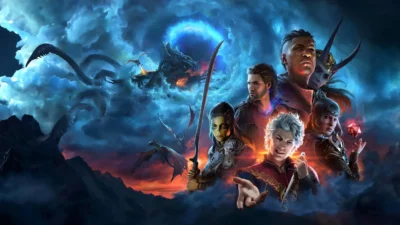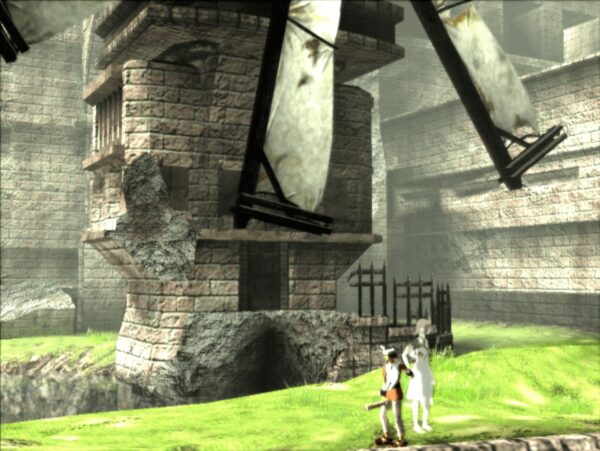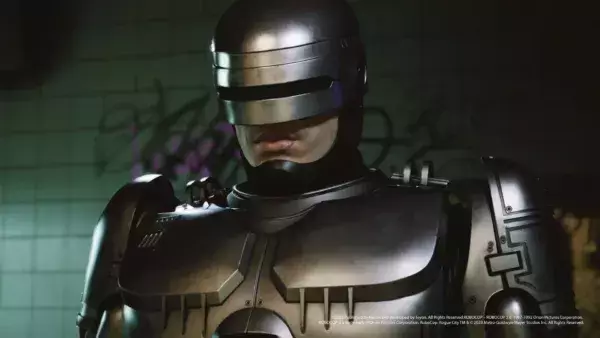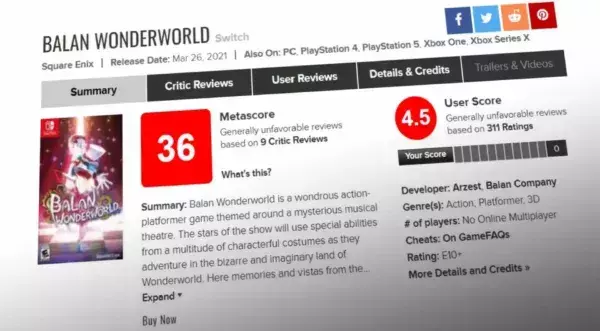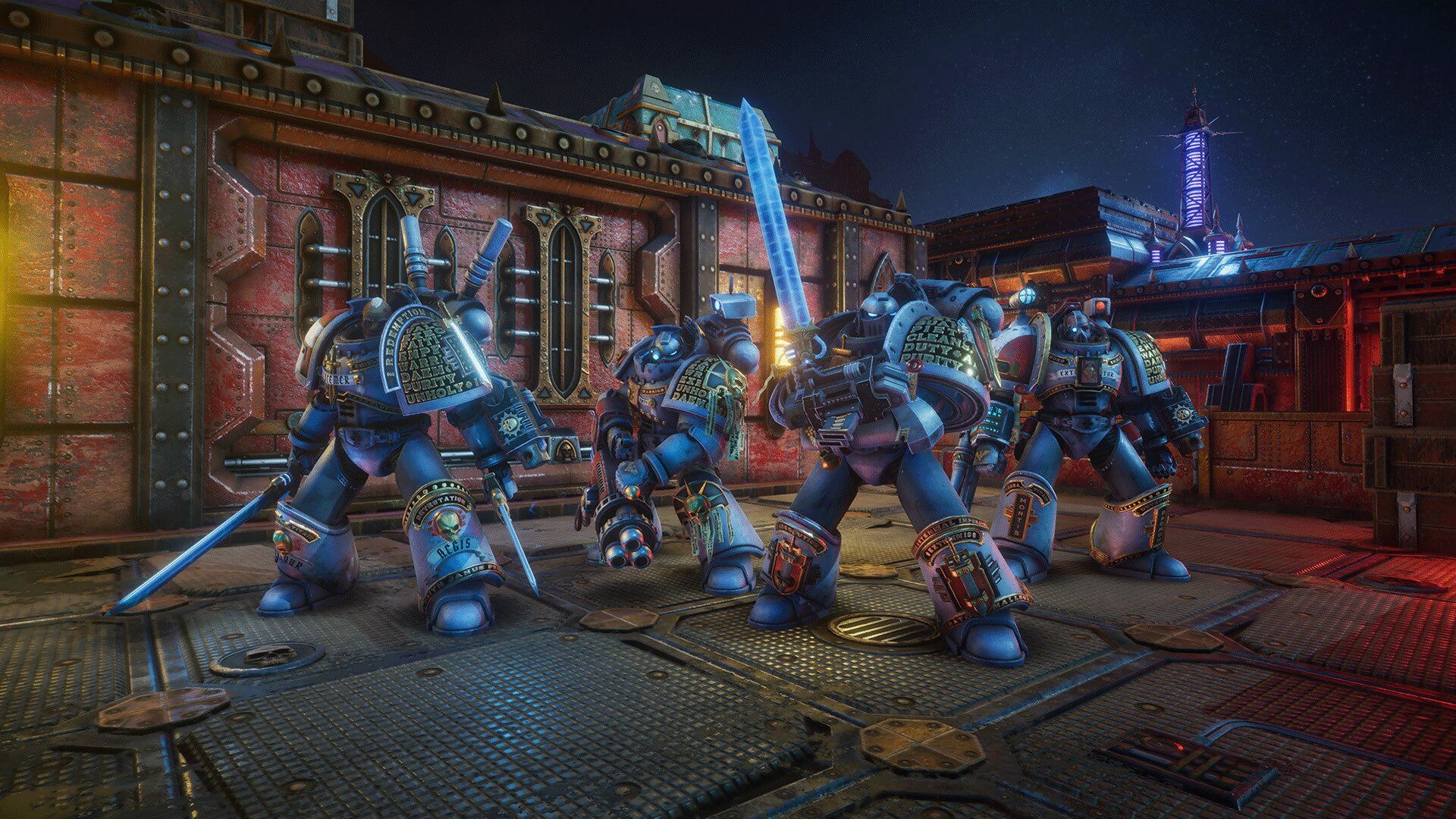
Consistency is key when building a science fiction universe. None more so than Warhammer 40K, though, where it continues to evolve and expand into multiple mediums. Games Workshop’s fantasy magnum opus may have started out as a war miniatures game played on tabletop, but it didn’t take long for its space military stylings to also invade books, films, and of course, video games; It hasn’t really stopped since 40K was first dreamed up in 1987.

Having an extensive home setup came in handy during the pandemic, when much of the Daemonhunters score was composed.
But how do you maintain the property’s consistency in all these facets, ensuring that every new series instalment is in keeping with the established tone and (perhaps more importantly) what your fan base has come to expect? Well, when it comes to sound at least, it helps to have an experienced ear you can always rely on.
Doyle W. Donehoo is just one of the composers who’s had a hand in creating the soundtracks for Warhammer 40K video games over the years, following in the footsteps of Jeremy Soule, Inon Zur, and others to bring new ideas to this human-versus-alien conflict set in the distant future. You only need listen to his work on Warhammer 40,000: Chaos Gate – Daemonhunters, the latest XCOM-style reboot of the 1998 PC game of the same name, to see how much music can contribute to the drama of a turn-based action title. Unsurprisingly, Donehoo finds that it helps to have an eclectic mix of genre inspirations and influences, something that dates back to his childhood days.
“I listened to music from the time of my very first memories,” says Donehoo on the origins of his musical interest, which began in the unlikeliest of places… “Church music, marching band music, musicals and more.” It wasn’t until later in his teens, however, that the future video game composer discovered blues, hard rock, heavy metal, and progressive music, all of which kicked off his fascination with how music and tech could combine. “I began the study of digital logic and programming languages,” he says, “and became a senior software engineer and project manager, and during that time I created my own MIDI data editor and sequencer and recorded a prog rock LP with it. Eventually, as the technology matured enough around 2000, I decided to become a professional composer full-time.”
THE DIGITAL FUTURE
The plan wasn’t always to specialise in video games necessarily, but where else would there be a need for a unique blend of traditional instrumentation alongside the more experimental techniques Donehoo was interested in? By this point, the world of Warhammer 40K had already ventured into the interactive space with Space Crusade for the Amiga, MS-DOS, and ZX Spectrum in 1992, providing a faithful translation of the board game. It was well received, even going so far as to have a dedicated composer in Barry Leitch – not always a guarantee in the video game world at the time.

Despite being a reboot of the original Chaos Gate from 1998, Daemonhunters features an all-new soundtrack to match the all-new visuals.
It was the 40K game that released just a year later, however, that would capture Donehoo’s attention as a fan of music, as well as games played on tabletop, PC, and console. “I’ve played war-games all my life, starting with Risk,” he reveals. “I have been playing video games since the days of DOOM. There is a very old Warhammer video game called Space Hulk that introduced me to the Warhammer world, but that was way before I really got involved.”
DAWN OF WAR
Donehoo’s affiliation with Warhammer 40K proper began way back during E3 2003. Having already established himself as a full-time composer on games such as Sniper: Path of Vengeance and Black Stone: Magic & Steel, he travelled to the industry event in the hope of setting his sights on something bigger.
Recalling his love for Space Hulk on MS-DOS, Donehoo was delighted to see developer Relic Entertainment exhibiting a new spin-off from a certain tabletop sci-fi franchise.
“I was attending the convention and I saw a very cool rolling demo of Warhammer 40,000: Dawn of War, and I was blown away,” Donehoo explains. Instantly, he could see that this RTS focused on a squadron of military space marines fighting a future war was something he could sink his teeth into.
“[It] was a game that was made for me to score, as it was perfect for what I wanted to do,” he says. “I gave Relic my card, my demo, and probably too much of my chatter. The game probably didn’t come out for another year, and there were sequels. But I kept sending them emails and demos, and meanwhile scored a few non-Warhammer games to sharpen my skills.”

Space Hulk: Deathwing is the first and only Warhammer FPS game Donehoo scored, for which he partnered with fellow composer Jonathan Cacherat.
The first Dawn of War, scored by Jeremy Soule, was a roaring success for Relic and publisher THQ, and managed to capitalise on the PC real-time strategy boom that was occurring in the early 2000s. Three expansion packs – Winter Assault, Dark Crusade, and Soulstorm – followed, making the prospect of Donehoo getting his foot in the door increasingly less likely. When the prospect of a full sequel arrived, however, it turned out the budding composer’s persistence (alongside the passion he showed at that initial E3 meeting) had paid off. “Finally, they allowed me to audition for Dawn of War II,” he recalls. “They sent me some videos and artwork, and in return I buried them in music. So, I got the job.”
Donehoo was already a massive fan of the original Dawn of War by the time he got the gig, playing each one of those expansions and fully engrossing himself in Soule’s score. As a result, Relic would have been hard-pressed to find anyone more suitable to step into the role of composer. Released for PC in 2009, Dawn of War II, like most sequels, was intended to be bigger and better in every way, and it wasn’t lost on Donehoo just how much the score had to reflect that.
SYMPHONIC SCI-FI
Comprised mostly of what Donehoo dubbed “grand orchestral music”, the soundtrack for Dawn of War II ended up being made using Donehoo’s personal instrument collection – not to mention the virtual orchestra living inside his soundboard. In a bid to keep the budget down, no live recording sessions with a band were used. Despite that, though, Donehoo’s score perfectly encapsulated the Warhammer 40K world’s epic, militaristic feel, boasting a seamless blend of dramatically tense string sections and ominous drums. It was something this universe’s unique mix of sci-fi and hard fantasy perfectly allowed for. As an example, Donehoo concocted a technique he dubbed “junkyard percussion” for the race of in-game orcs, which he hypothetically envisioned would grunt along to the rhythm.
Like the first Dawn of War, the sequel received various expansions that Donehoo would also go on to score. This partnership kicked off what has now been a decade-long relationship between the two parties, covering several Warhammer 40K games, including first-person shooter spin-off Space Hulk: Deathwing, Battlefleet Gothic: Armada, and its sequel, all the way up to today with the aforementioned Warhammer 40,000: Chaos Gate – Daemonhunters.

From Grey Knight space marines to even the orcs themselves, Donehoo has developed a musical vocabulary for each of Warhammer’s races.
What is it about the world of Warhammer 40K and this rich universe Games Workshop has created (which shows no signs of slowing down) that keeps Donehoo coming back for more? The answer, it turns out, couldn’t be simpler. “Well fortunately, Warhammer keeps returning to me,” he jests. “I think I set the tone for the Warhammer universe with Dawn of War II, and as long as people want that, I will keep doing Warhammer music, which I am.”
The music for Chaos Gate – Daemonhunters presented its own unique obstacles, though. Because while it may be heavily influenced by Donehoo’s previous Warhammer work – and indeed the 1998 original, sound-tracked by composer Jim Crew – much like with Space Hulk: Deathwing, Donehoo was entering an all-new genre. Unlike the Dawn of War series, which sees its action play out in real time, more modern PC gamers apparently prefer their battles to be turn-based.
“Chaos Gate had its own challenges,” the composer says. “Unlike the flow of a real-time strategy game, Chaos Gate is turn-based, and the approach had to be adjusted.”
This reason for this change of musical pace is something even Donehoo himself struggles to put his finger on. “I can’t explain how,” he says. “That would be like tap-dancing about paintings. It’s just a feeling. You must listen to the music in the context of the game.”
OLD TO NEW
Daemonhunters being a reboot, however modernised it may look and feel, certainly gave developer Complex Games a good template to work from. As the studio’s second Warhammer game and first major PC release in almost seven years, there’s definitely a level of risk involved, but the title’s recent reviews would indicate it’s one that has paid off. Did Donehoo find similar solace in his latest work being based on a pre-established game? “I really didn’t know it was a reboot of anything until much later,” he reveals. “I liked that it would be similar to Mutant Year Zero or XCOM because I liked playing those kinds of games. And I liked that the approach was going to be used for a Warhammer game.” It’s no wonder, then, that the new soundtrack for Daemonhunters shares little in common with what players heard in the original.

In addition to scoring the Dawn of War II base game, Donehoo was more than happy to return for the Chaos Rising and Retribution PC expansions.
The 40K universe, from Dawn of War II in 2009 up until Chaos Gate – Daemonhunters may always stay a constant for Donehoo, but in that time, one thing he’s grown to appreciate is getting to work with different creative outfits. Not that he knew it at the time, but handing Relic Entertainment his business card at 2003’s E3 would kick off a domino effect of sorts that has seen him work with multiple studios, all operating under the Warhammer banner. As a result, he can offer up just as much musical direction as the developer – if not more. “I think I had a good handle on Warhammer music to begin with,” he explains, “but the art and videos that Complex Games gave me [on Chaos Gate] were a big help for me understanding the direction they wanted me to go.”
Now, with well over a decade’s worth of experience scoring Warhammer 40K games under his belt, Donehoo is part of a small collective of composers responsible for crafting the way the universe sounds. And even then, it’s hard to picture anyone else having a greater understanding of this – at least within the realm of video games. So natural has Donehoo’s approach become, that to him, aspects like the theme, tone, and mood of the music he creates is hard to define. “Words like dark, heroic, vast, tragic, resolute – they do not do it justice,” he enthuses. “The world is just too big. I try to match the tone for the part I have to play.”

Donehoo has been a musician all his life, but cut his teeth working as a software engineer before composing video games full-time.
Warhammer 40,000: Chaos Gate – Daemonhunters being so well received recently proves that Donehoo hasn’t lost his touch. And as such, he doesn’t plan on going anywhere soon. That said, there are sides to 40K he’d still love to see translated, which he’s ready to pour his prowess and passion into. “I would love to write music for Ciaphas Cain,” he enthuses, referencing a Warhammer novel series centred on the eponymous character.
“I have read all of the books multiple times – and I do mean multiple times. I may be a Sandy Mitchell [the author] groupie. I think I was reading the Cain books while composing Dawn of War II – I keep reading [them] because it’s my happy place.”
If Games Workshop ever wants Ciaphas Cain music in any form, they know where to look. “I can bring it!”


